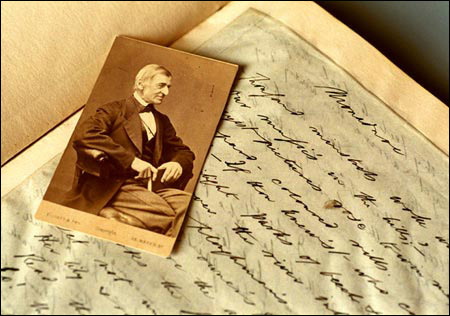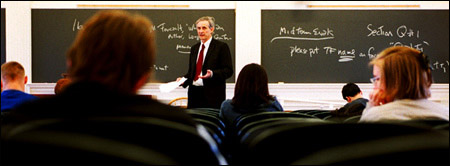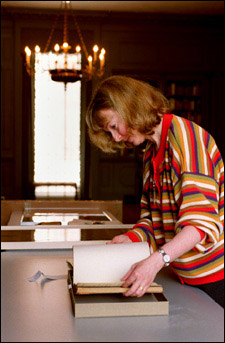An abiding presence:
Throughout campus, Emerson’s 200th birthday is focus of fetes, forums, and exhibitions

What would Ralph Waldo Emerson say about the events planned to commemorate his 200th birthday?
I had better never see a book, than to be warped by its attraction clean out of my own orbit, and made a satellite instead of a system.
Emerson’s words continue to inspire:
The American Scholar
An oration delivered before the Phi Beta Kappa Society, at Cambridge, August 31 1837
Divinity School address Delivered before the senior class in Divinity College, Cambridge, July 15, 1838
Events
May 25 marks the 200th anniversary of Ralph Waldo Emerson’s birth in Boston. Harvard University will be hosting a series of events.
Emerson is a Harvard alum (Class of 1821), as well as a central figure in the 19th century Transcendental movement in literature and philosophy.
- Harvard’s Houghton Library, one of the major repositories of Emersoniana in the country, launched an exhibit March 26 titled ‘Ralph Waldo Emerson: A Bicentennial Exhibition.’ It traces Emerson’s early years as a Harvard student through his later years as ‘The Sage of Concord.’
- Andover-Harvard Theological Library, now through June 7, Stendahl Lobby, floor 2: ‘Celebrating Emerson’: Manuscripts, publications, photographs, and memorabilia from the collections of the Andover-Harvard Library illustrating Emerson’s life, circle, past commemorations, and his Divinity School Address.
- Professor Lawrence Buell (English) and Professor Stanley Cavell (philosophy) are publishing major books on Emerson this spring.
- On April 24, 4:30 p.m., former U.S. Poet Laureate Robert Pinsky will lecture on Emerson in room 105, Emerson Hall.
Would he be pleased and honored, or would he dismiss all the hoopla with a censorious shake of his head as just another misguided attempt to replace the living thought of a man with a lifeless monument?
Of course, we’ll never know for sure, but if there is any place where it should be possible to commune with the soul of Emerson and learn his true intentions, it would be here at Harvard. Concord, the town where Emerson and many of his Transcendentalist colleagues made their homes, may stake a rival claim, but if one were to base the distinction on the sheer quantity of artifacts directly related to Emerson’s mental life, Harvard would win, hands down.
“Emerson’s family was very concerned with preserving his papers, and beginning in the early 20th century, they started turning over everything they had to Harvard,” said William Stoneman, the Florence Fearrington Librarian of the Houghton Library.
As a result, Houghton Library is the depository for original Emerson materials, with about 40 linear feet of journals (the earliest from his student days at Harvard, Class of 1821), a full aisle’s worth of correspondence, and even the personal account books in which he recorded every half-penny that came in or went out.
Nor are books and papers the only reminder of Emerson’s presence at Harvard. Emerson Hall (completed in 1900) commemorates the philosopher in brick and limestone, and contains a life-size bronze statue of the seated Emerson by the American artist Frank Duveneck. One might expect the inscription above the north entrance to be by Emerson, that most quotable of authors, but in fact it is from the Book of Psalms: “What is man that Thou art mindful of him?” (8:4).
On Aug. 31, 1837, Emerson delivered the Harvard Phi Beta Kappa address at the First Parish Church on Church Street. In that talk, titled “The American Scholar,” Emerson pleaded so forcefully for originality in American letters that Dr. Oliver Wendell Holmes later called the oration “our intellectual Declaration of Independence.”
At Divinity Hall, one of Harvard’s oldest buildings (1825), visitors may still see the chapel where Emerson delivered his famous Divinity School Address on July 15, 1838, in which he told the graduating class of future ministers: “Let me admonish you, first of all, to go alone; to refuse the good models, even those which are sacred in the imagination of men, and dare to love God without mediator or veil.” The address so displeased the faculty that Emerson was not invited back to Harvard for many years.
But Harvard eventually forgave him, awarding him an honorary LL.D. degree and electing him to the Board of Overseers in 1866. In 1870, he was invited to give a series of lectures on philosophy.
Now, with Emerson’s bicentennial approaching (his actual birthday is May 25), Harvard is taking part in a worldwide celebration stretching from Boston to Beijing.
An exhibition drawn from Harvard’s immense Emerson holdings is now on display at Houghton Library. On April 2 a forum took place in Sackler auditorium at which a group of distinguished presenters addressed the topic “Emerson in the Twenty-First Century.” On April 24, 4:30 p.m., former U.S. Poet Laureate Robert Pinsky will lecture on Emerson in 105 Emerson Hall.

Lawrence Buell, organizer of the April 2 forum, believes that even 200 years after his birth, Emerson continues to have an impact in the fields of philosophy, literature, religion, and social thought.
“Emerson was the first bona fide public intellectual in the history of the United States,” said Buell, the Powell A. Cabot Professor of American Literature. “He is one of the catalytic figures in the emergence period when writing in the United States matures and gets international attention.”
Transcendentalism, which Emerson spearheaded, was the first philosophical movement in the U.S. to take Eastern thought seriously and thus marked the beginning of the comparative understanding of world faiths. Philosophically, Emerson exerted a major influence on William James, John Dewey, George Santayana, and others, and helped shape the uniquely American tradition of Pragmatism. Even the German philosopher Friedrich Nietzsche found inspiration in his writings.

While some debate Emerson’s credentials as a social reformer because of his focus on the individual rather than the group, there is no doubt that through his writings and public lectures he helped to support the anti-slavery movement and other reform efforts.
“As long as thinking people feel trapped in states of disempowerment and struggle with the sense that they’re prisoners of convention and social pressure, Emerson will be a resource,” Buell said.
In selecting items for the Houghton exhibition, co-curators Ronald Bosco, the Distinguished Service Professor of English and American Literature at State University of New York, Albany, and Joel A. Myerson, the Carolina Distinguished Professor of American Literature at the University of South Carolina, tried to show the evolution of Emerson’s ideas as reflected in his letters, lectures, and especially his journals.
“The beginnings of everything he did are in the journals – original ideas, anecdotes, passages on other people, the opening paragraphs of his lectures,” said Myerson.
The exhibition offers a rare opportunity to trace Emerson’s intellectual development from his days as a scholarship student at Harvard to his canonization as a beloved sage whose death in 1882 occasioned a greater number of eulogies and editorials than that of Lincoln.
One reason for Emerson’s popularity was that he was not only an author but an extremely active and successful speaker, delivering about 1,500 lectures during his career.
“He was an amazingly visible figure,” said Bosco. “He spent six months out of every year on the road, traveling as far west as San Francisco. After he died, people reminisced about him for the next 30 years. There are many written accounts of people talking with him on a bench at a railroad station or on a train.”
His popularity continues to this day. Emerson quotations can be found in self-help books, calendars, and on many a personal Web site. Emerson’s message of self-reliance has even caught the imagination of people in the sports world. Bosco remembers hearing Woody Hayes, coach of the Ohio State University football team, declare that he often peppered his pregame pep talks with Emersonian maxims.
“Any time you have a major American writer quoted by a football coach in the locker room, you know he cuts across all boundaries,” said Bosco.




